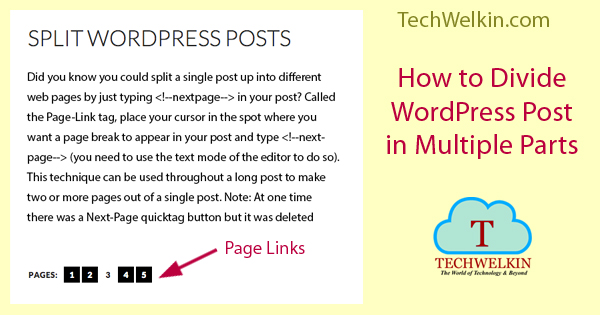This morning I wrote about how you can reduce bounce rate of your website. One of the tips I gave in that article involves splitting of one post into many parts. WordPress provides a very easy way to divide your post in as many parts as you want.
I also cautioned against excessive use of such division because this will dilute the impact of your post on both search engines as well as humans.
But if you really have a very long post and readers have to endlessly keep on scrolling to reach the end of it —then you can opt for splitting and multi-part post.

It’s easy but use it sparingly!
WordPress has an in-built feature to this end. If you enter the following code anywhere in your post, the post will get split from this point onwards.
<!–-nextpage–->
IMPORTANT NOTE: This code must be entered in Text mode when composing your post. If you enter this code in Visual mode —this will not work.
You can keep on adding this code in your post content to split it into as many pieces as you want. The following example will create a four-part post.
Content <!–-nextpage–-> Content <!–-nextpage–-> Content <!–-nextpage–-> Content
When you publish such a multi-part post; navigational links will automatically appear at the end of each part of your post. You can stylize these pagination links by setting / modifying CSS rules in your stylesheet.
Whether navigation links will appear or not —depends on your theme. The following line of code, in single.php, is responsible for showing pagination links:
<?php wp_link_pages(); ?>
If you’re using a good enough theme, links should automatically appear. But in case pagination links refuse to show their face, you can just go to single.php and add the above line of code into it at a place where you want links to appear.
Not only CSS styling —you can even change the text of pagination links. So, instead of
1,2,3
you can have links like
Page 1, Page 2, Page 3
and also like
<< Previous Part | Next Part >>
or anything else of your choice. For these options, the entire tutorial is available in WordPress Codex for Stylizing Page Links. Have a look at it to learn more.
Can you create multi-part pages in WordPress? Yes! the same code works on posts as well as pages.
Now the final question in this regard is: why to go for multi-part posts? Well, there are several good reasons:
- It decreases bounce rate, as I mentioned earlier
- Multi-part posts increase the number of page views
- More page views may translate into higher revenue (as more ads will be shown)
- It looks nicer than having a very long post that would otherwise span over ten A4 size pages!
- It saves your reader from losing his way while scrolling high up and bottom down
- It may make printing easier (but in some cases, difficult too!)
Well, this is it for today. If you have any questions, comments or suggestions —feel free to say it in the comment box. Thank you for using TechWelkin.

Leave a Reply